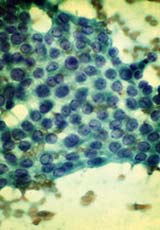 UPMC’s Endocrine program is nationally recognized for clinical and basic research.
UPMC’s Endocrine program is nationally recognized for clinical and basic research.
Our work has been reported in the following journals: Surgical Oncology, Thyroid, Advances in Surgery, Surgery, World Journal of Surgery, American Journal of Clinical Pathology, Oncogene, and Neoplasia.
We have ongoing clinical research projects in detection of MEN syndromes, radiologic evaluation of adrenal tumors, and improvement of obstructive sleep apnea symptoms after thyroidectomy for goiter.
Our extensive prospective parathyroid database includes more than 2500 patients with parathyroid disease.
For Patients:
Our mission is to develop new treatments for cancer. We currently have seven full-time and ten part-time basic research faculty within the Division of Surgical Oncology working to develop novel therapies for cancer. This includes the development of biologic therapies (immunotherapy, gene therapy) for cancer.
Many exciting advances in this field have come from within the division. The division is ideally structured to translate our basic research findings in to the clinics.
Our active clinical practices yield numerous instances where standard therapies are inadequate. In these cases patients are encouraged to consider clinical trials of novel therapies.
You may be asked to participate in these trials during your appointments.
For Clinicians and Other Health Care Providers:
The principal theme of our overall research involves defining the underlying immunobiology of cancer in order to design and implement more effective preventive, adjunctive and therapeutic clinical regimens. With these objectives in mind, our efforts in research are comprehensive.
Effective use of cytokines in the biologic therapeutics, implemented either as recombinant proteins applied systemically or via gene therapy applied locally are studied intensely. Likewise, considerable efforts are invested in the development of vaccines that are capable of stimulating cellular anti-tumor immunity.
Much of our research is also focused on delineating mechanisms of immune-mediated killing of tumor cells and means by which tumors may evade immune clearance. In aggregate, these investigative conclusions help us to define important elements of combinational cancer therapies that we currently believe will prove most effective in the clinical setting.
Translational research in the Division of Surgical Oncology is well supported by numerous grants from the National Institutes of Health (NIH) and the National Cancer Institute, as well as by a number of investigator-initiated grants from private foundation and industry.
For further information regarding individual research, please call 412-383-8603.
















 UPMC’s Endocrine program is nationally recognized for clinical and basic research.
UPMC’s Endocrine program is nationally recognized for clinical and basic research.

